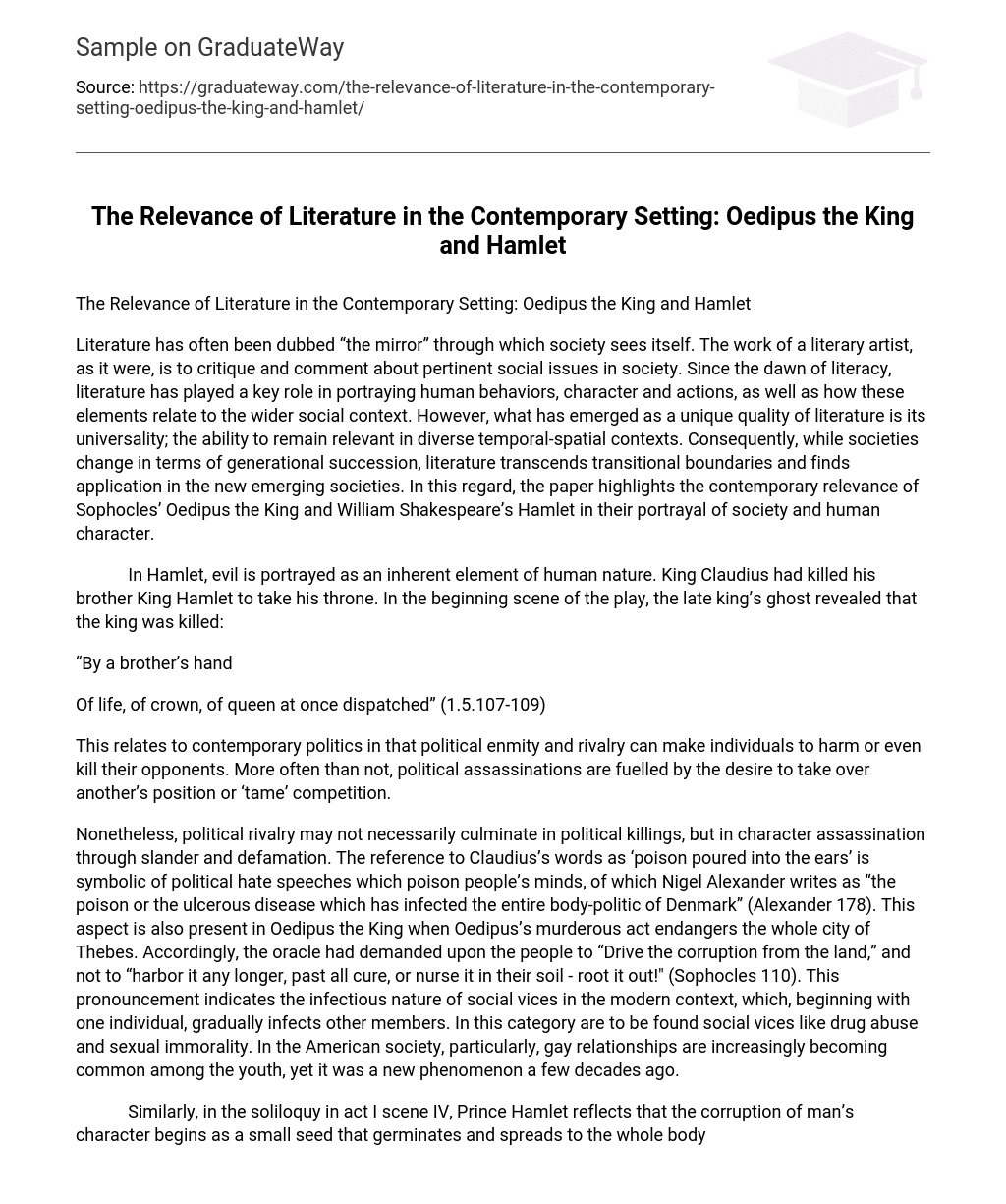Literature has often been dubbed “the mirror” through which society sees itself. The work of a literary artist, as it were, is to critique and comment about pertinent social issues in society. Since the dawn of literacy, literature has played a key role in portraying human behaviors, character and actions, as well as how these elements relate to the wider social context. However, what has emerged as a unique quality of literature is its universality; the ability to remain relevant in diverse temporal-spatial contexts. Consequently, while societies change in terms of generational succession, literature transcends transitional boundaries and finds application in the new emerging societies. In this regard, the paper highlights the contemporary relevance of Sophocles’ Oedipus the King and William Shakespeare’s Hamlet in their portrayal of society and human character.
In Hamlet, evil is portrayed as an inherent element of human nature. King Claudius had killed his brother King Hamlet to take his throne. In the beginning scene of the play, the late king’s ghost revealed that the king was killed:
“By a brother’s hand
Of life, of crown, of queen at once dispatched” (1.5.107-109)
This relates to contemporary politics in that political enmity and rivalry can make individuals to harm or even kill their opponents. More often than not, political assassinations are fuelled by the desire to take over another’s position or ‘tame’ competition.
Nonetheless, political rivalry may not necessarily culminate in political killings, but in character assassination through slander and defamation. The reference to Claudius’s words as ‘poison poured into the ears’ is symbolic of political hate speeches which poison people’s minds, of which Nigel Alexander writes as “the poison or the ulcerous disease which has infected the entire body-politic of Denmark” (Alexander 178). This aspect is also present in Oedipus the King when Oedipus’s murderous act endangers the whole city of Thebes. Accordingly, the oracle had demanded upon the people to “Drive the corruption from the land,” and not to “harbor it any longer, past all cure, or nurse it in their soil – root it out!” (Sophocles 110). This pronouncement indicates the infectious nature of social vices in the modern context, which, beginning with one individual, gradually infects other members. In this category are to be found social vices like drug abuse and sexual immorality. In the American society, particularly, gay relationships are increasingly becoming common among the youth, yet it was a new phenomenon a few decades ago.
Similarly, in the soliloquy in act I scene IV, Prince Hamlet reflects that the corruption of man’s character begins as a small seed that germinates and spreads to the whole body:
“From that particular fault: the dram of eale
Doth all the noble substance of a doubt
To his own scandal” (1.4.36-38)
Thus, a single evil act, like the poisoning of the King by his brother Claudius, becomes an infection that affects the individual and society in general, which has “rotten the state of Denmark” (1.4.67). In the modern world, the actions of individual leaders affect the whole society such as grand corruption at high levels of government, which gradually finds its way to junior administrative units and eventually among the public.
Oedipus the King portrays human character in terms of its flaws which lead individuals to self- destruction. It reveals how heroic characters over-engage their abilities or unwittingly use their position to orchestrate their own fall. Oedipus’s wisdom elevated him to the pedestal of leadership, but his overbearing determination to prove his worth by getting at the murderer of King Laius opened the way for his downfall. What is portrayed here is the fact that positions of advantage could be a trap that could ruin individuals’ lives (Cahn 325). There was MJ the pop icon, whose fortune plunged him into the world of drugs, where addiction gave him a deadly kick, literally. Among the living, the Tiger of golf is yet to come out of the woods after a sex scandal that stained his career. It is not that other men are saints between their legs; rather, like Oedipus and King Claudius, his position demands a little more nobility of character than in common men. To whom much is given, much is expected!
Works Cited
Alexander, Nigel. Poison, play, and duel: a study in Hamlet. New York: Taylor &
Francis, 1971
Cahn, Victor L. The plays of Shakespeare: a thematic guide. New York:
Greenwood Publishing Group, 2001
Shakespeare, William. “The Tragedy of Hamlet, Prince of Denmark.” The Norton
Shakespeare. Ed. Stephen, Greenblatt, et al. New York: W.W. Norton & Company, 1997, 296-384.
Sophocles. Oedipus Rex: (Oedipus the King). New York: Digireads.com
Publishing, 2005





